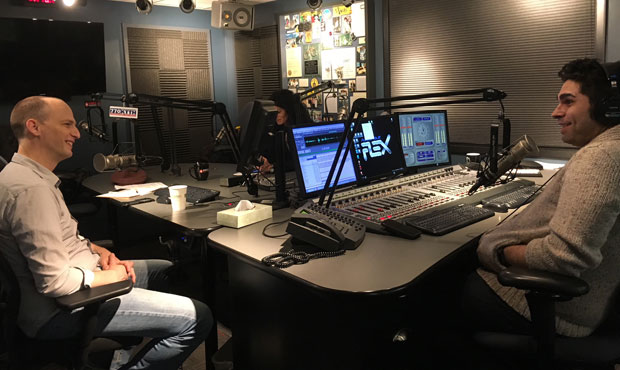Former SDOT director Scott Kubly says he wasn’t fired
Feb 1, 2018, 7:50 AM | Updated: 10:31 am

Scott Kubly and I meet again. (KTTH image)
(KTTH image)
Scott Kubly resigned as director of the Seattle Department of Transportation two weeks after Mayor Jenny Durkan took office.
He tells 770 KTTH’s Jason Rantz he wasn’t fired.
“The job is draining. It’s a challenging job. You get incoming from all different directions. If you’re doing it right I don’t think you’re making anybody happy because you’re balancing a bunch of different competing priorities. You have 700,000 people who have a unique vision for the city. That’s exhausting. If you’re pushing as hard as you should, you’re going to wear yourself out.”
Listen to Scott Kubly’s entire interview
So what is Kubly most proud of from his time at SDOT?
“In the last five years we added 50,000 employees into downtown and only 2,000 drove by car; 45,000 of those people got to work walking, biking, taking transit,” Kubly said
“I think it is symbolic of what’s happening in the city where our transit ridership is growing faster than any other city in the country and it’s growing at a time when almost any other city’s transit ridership is down as it gets cannibalized by Uber and Lyft,” he said. “And we’re up across every mode except driving alone, which is a testament to the policies.”
That point is among a few insights into Kubly’s time leading Seattle’s transportation office.
Seattle Bikeshare
Seattle experimented with a bikeshare program under Kubly — Pronto. It failed after the city bailed it out for $1.4 million. Currently, however, Seattle has three dockless bikeshare companies operating in town. They have been successful enough to begin launching electric bikes as part of their service.
“Everywhere else that bikeshare has been ruled out, it has been hugely successful,” Kubly said. “… Seattle has a very weird relationship with bikes. People feel really strongly about them – both pro and con.”
RELATED: Kubly leaves office as Seattle shakes up leadership
“There’s a lot of lessons to be learned (by Pronto) … I think the dockless model is a superior model,” he said. “It doesn’t require taxpayer dollars, it’s cheaper, it’s got a better pricing model … It’s got the parking issues, but when we started pushing to expand Pronto, that model didn’t exist.”
Kubly said that Pronto was a risk. But he’s glad Seattle took it.
“What’s unfortunate about the nature of government service is it’s an environment where taking risks is not appreciated or valued,” Kubly said. “We took a risk and it didn’t work, and we tried it again and it didn’t work. We tried it again and it still didn’t work. We tried it a fourth time and now it’s worked. If you were an entrepreneur you would be lauded for taking risks and your willingness to take risks.”
RELATED: Jason Rantz and an awkward video with SDOT’s director
“What I hope the department takes out of it, what the people working in the department takes out of it, is that it is OK to take risks,” he said. “If something didn’t work the first time, it doesn’t mean it won’t work, it just means you need to try it differently.”
Evolving Seattle traffic
One thing Kubly says people should understand is that Seattle is growing very quickly. He thinks Seattle has weathered the challenge well, so far.
“I loved my time with the city and I think it was a really unique time in American urban history,” Kubly said. “There’s never been a city that is fully built out like Seattle, that’s growing as fast as Seattle is. That is inevitably going to generate heartburn as communities change, as people’s lifestyles change, as their expectation of what their normal commute looks like is going to change – that’s going to engender strong feelings.”
“If you want to go to a city without congestion, there are plenty of cities in the industrial Midwest where the economy has collapsed, where there is very little congestion,” he added. “You are never going to be in a city that is growing as fast as Seattle, as dense as Seattle, without having congestion. That’s just the economic reality.”
Scott Kubly criticism
Kubly said that he didn’t take criticism of his work personally. It’s part of the job if you are working for Seattle — a city growing in very exclusive ways.
“When I would walk out the front door and I would see a pothole, I would view that as a personal and professional failing,” he said. “Now I get to just walk out and see a pothole and say, ‘Why isn’t the city doing anything about that?’ People pay taxes, they have the right to expect high-quality service and they have the right to critique the people that are delivering it.”














